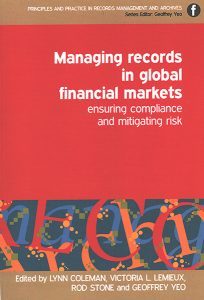
Edited by Lynn Coleman, Victoria L. Lemieux, Rod Stone, and Geoffrey Yeo
This timely book fully explores current regulatory, legal, and governance issues associated with managing records in global banking and finance businesses. It offers strategies and examples of best practice to meet the record-keeping challenges in corporate and commercial banking enterprises operating in global capital markets.